Hmmm… I notice that peoples’ “hits” on the Blog are down since we’ve started traveling again. Hey, folks, it’s not healthy to do “religion” all the time, much as I love it. Orthodoxy is experiential. There are other ways of learning about God. Travel, for example. When we’re in different places (if it’s only grandma’s and grandpa’s house) we see familiar things, including our faith, in a different light.
Here’s the theological principle behind this: This is God’s world, all of it, filled with God’s people, all of them created in his image. Christ is the Logos who is behind all things, working in all things. He is “out there” in the world, not just “in here” in the Church. Of course we judge everything in light of Jesus Christ, God Incarnate, who is the final, ultimate relevation. The world cannot teach us new things about God. But it certainly can remind us of things we have forgotten or neglected, point us towards things we’ve missed.
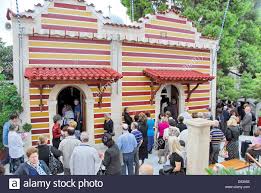 So, picking it up from last week, here we are still praying outside the chapels, reading the Paraklisis to Saint Nektarios, now surrounded by pilgrims as the buses unloaded and people walked up from the parking lot below.
So, picking it up from last week, here we are still praying outside the chapels, reading the Paraklisis to Saint Nektarios, now surrounded by pilgrims as the buses unloaded and people walked up from the parking lot below.
Now, what this trip caused me to think about was…
Caring for the Sick
For 2 reasons:
1 We were reading the Paraklisis especially for our son-in-law, our daughter and our grandchildren. As the 2008 recession continued, Paul had lost his job and thus had lost health coverage from his company. They could get minimal care, but their savings were being wiped out, and all it would have taken was a major accident or disease and they might have been ruined. Saint Nektarios worked slowly. It took about a year, but Paul found a good job, and they’re back on their feet. Thank you, Saint Nektarios. But we were very worried.
2 Later, while we were at our hotel on Crete, Khouria Dianna strained her back badly. (Are all Greek hotel mattresses made of boards?) What to do? Maria, who helped run the hotel, sent us to an independent iatros/γιατρός/doctor down the road. We went, Dianna in great pain, and discovered the doctor would have gladly come to the hotel, no extra charge – as they did in America when I was young. (I remember when I strained my neck, and Dr. Nemcik came to call.) The cost for an hour’s care was only 40 Euros, approximately $40.
The doctor was a very nice German woman who worked in Greece during the summer. Winters she practiced medicine in Germany where she said the universal health care system was excellent, much better than Greece’s. (But in those days, even as a visitor in Greece, I would have been covered. Today, because of their deep recession, Greece’s health care has gone ‘way downhill.) However, in 2010 Maria had only this complaint: She had recently broken her leg, spent a week (!) in the hospital and, despite Greece’ss health care system,, actually had to pay a small portion of the cost herself. The doctor wanted her to stay even longer, but she didn’t much like the nurses so she got a crutch and went home. In Khouria Dianna’s case the next day, for 40 Euros, a physical therapist came to the hotel for an hour, gave her a helpful massage and gave us both some back exercises which I use to this day.
And then I looked back home, and I started to think how, in this matter, the US for all our virtues is so different from the rest of the civilized world.
Health Care: there and here
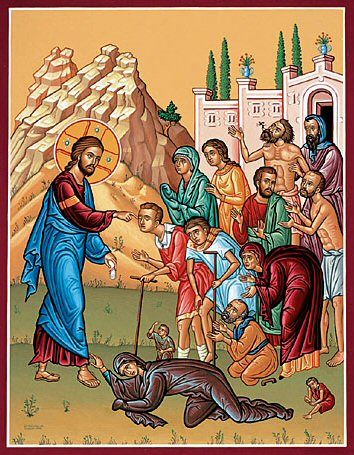 I am now going to write about a political issue. So cover your eyes if you wish.
I am now going to write about a political issue. So cover your eyes if you wish.
However, this is really a moral issue. Only in the US is this still a political issue, and I don’t know what the solution is. But I do know that Jesus said if we ignore “the hungry or thirsty or strangers or naked or sick or in prison”, we ignore him. Matthew 25. And if I remember correctly, he added that if we don’t care for the sick we will go to hell.
The United States is the only wealthy first world country where my grandchildren could be left without health care, which does not have universal healh coverage. More than a few people in our suburban parish have had to go without health care for extended periods.
I know of a student from western Europe who came to the United States and really liked America and Americans and was tempted to stay, but decided in the end to go back home “where we care for our people”. Sierra Leone in third world Africa, for heaven sake, now provides full coverage for all expectant mothers and new mothers. While we were in Athens I saw a cartoon in the International Herald Tribune which showed Uncle Sam riding on an old 1890s-style high wheel bicycle with modern cars speeding past him, with the caption: “While all the world goes by”.
So our 2010 trip raised 3 questions in my mind:
1 Why, in our predominantly Christian country, are our leaders not focused on how to obey Jesus’ command, instead of on how to disobey him? We’ve been fussing and fighting over this for a century. Nations everywhere have managed to figure it out. Germany has had universal health care since 1883.
2 I’ve pondered this for years: Why do secularized western European countries care for their poor and sick so much better than we do, in our very “religious” United States? All my theories say it should be the opposite. If you have the answer to this, I’d be grateful if you would share it.
3 Why is it assumed here that if you’re Traditional theologically, you’ve got to be arch-conservative politically? (This is in parochial American categories. Political lines are different in other countries.)
Well, don’t say I didn’t warn you. I told you ‘way back at the beginning of this Blog series that I would occasionally comment on what my travels led me to think about.
OK, I’m done pontificating – or should we Orthodox call it “heirarchicalizing”? You may now open your eyes again.
Back to Saint Nektarios
After we finished the Paraklisis, we went to the store to get a book of Saint Nektarios services to replace 1 I had lost, and 12 bottles of Saint Nektarios oil and 12 little icons for distribution at home.
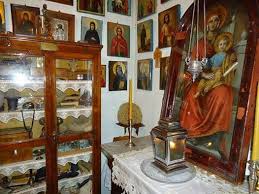 I did it in Greek! “Tha ithila ilios dodeka, ikones dodeka kai to biblios, parakalo. Poso kanei?” And the clerk actually understood me! thanks to Zoe’s Greek class which she taught at Saint Nicholas a while back. No charge for the oil. Then I decided to win over the little widow: I gave her the list of names, along with the 300 or so in Euros which my people had given for Saint Nektarios. Now she broke into a big smile, gave us a bunch of Saint Nektarios picture cards and a calendar, and said, “Pray avrio” (tomorrow). So the nuns at Saint Nektarios prayed for us next day.
I did it in Greek! “Tha ithila ilios dodeka, ikones dodeka kai to biblios, parakalo. Poso kanei?” And the clerk actually understood me! thanks to Zoe’s Greek class which she taught at Saint Nicholas a while back. No charge for the oil. Then I decided to win over the little widow: I gave her the list of names, along with the 300 or so in Euros which my people had given for Saint Nektarios. Now she broke into a big smile, gave us a bunch of Saint Nektarios picture cards and a calendar, and said, “Pray avrio” (tomorrow). So the nuns at Saint Nektarios prayed for us next day.
We went down the hill to visit the big new church. A legless beggar was there. We gave. How could we not at Saint Nektarios? Then back up the hill. It was starting to rain, the taxi arrived, back to the port of Aegina, we wandered through the old town, past the nice church by the port, past the hotel where I once stayed at (did I ever tell you this?) where Saint Nektarios used to stay when he rode into town on his donkey to get supplies, with Saint Nicholas Church right next door which rings its bells just the way we ring ours at home and their tower clocks are always ‘way off just like ours, then a lemonada by the port, Flying Dolphin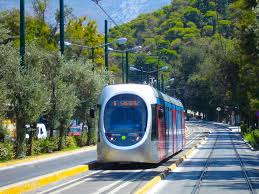 hydrofoil zoom zoom back to Piraeus, it was rush hour and highway traffic was horrible but we glided past it on the Tram, back to the hotel by 5, and our trip to Saint Nektarios was over – and I hope you don’t try to diagram this sentence. (Does anybody diagram sentences any more?)
hydrofoil zoom zoom back to Piraeus, it was rush hour and highway traffic was horrible but we glided past it on the Tram, back to the hotel by 5, and our trip to Saint Nektarios was over – and I hope you don’t try to diagram this sentence. (Does anybody diagram sentences any more?)
Visiting Saint Nektarios was always a ” ” experience for me, which is my way of saying words don’t even come close. Even on a cloudy day, as it was, the place felt light-filled, even the dark chapels. My eyes always teared up while I was there – me, Father Cool who guards his emotions, but not there. For a few years beginning with my first visit, Saint Nektarios did funny, sometimes startling little tricks for me. I’ve told you those stories. But now I said to him, “No tricks needed. You’ve convinced me, I know you’re there. Please, just a safe trip.”
Actually, the special treat that time was to have Khouria Dianna with me. Now, looking back, this seems like the foreshadowing of the wonderful thing this blessed saint and a doctor were going to do for us in a few years.
Crete
Crete is about a 45 minute flight south from Athens. In the old days I would take one of the more “romantic” overnight ferries. 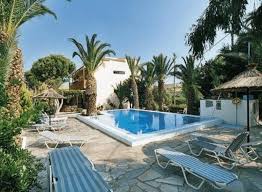 They still run, but I finally gave in to the modern world. We rented a car and stayed at our usual little hangout on the less touristed and much less expensive south coast
They still run, but I finally gave in to the modern world. We rented a car and stayed at our usual little hangout on the less touristed and much less expensive south coast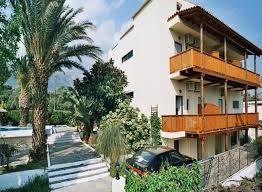 .
.
We got to Divine Liturgy on Crete all 4 Sundays. It was reassuring to be 6000 miles from home and find the Church almost identical, except the services were an hour earlier and in Greek, of course. However (Greeks, please forgive me for jumping in where I have no business) I have 3 complaints: 1 I don’t like the lack of peoples’ verbal participation. From the standings and sittings and crossings you can tell the congregation are closely involved, but come on, at least encourage them to say the Creed and the Our Father. 2 The few adult Communions. Christ said “eat, drink”, not just look. 3 Except in a few churches, the lack of regular preaching. They’re going to be sorry about that. Even in Greece which is 95% Orthodox there are strong secular influences. People need to hear the Gospel.
Nevertheless, the Church on Crete felt very alive. On 3 Sundays the churches were full to overflowing. On the 4th the church  was about 2/3 full, but there was a wedding in the village that afternoon, and Khouria Dianna thought people were waiting for that. At various churches and monasteries I said prayers and lit candles. I’ve told you in Greece there’s almost always a chapel or church or 3 or 4 in sight. 1 day as I drove I decided to follow the pious custom of making the sign of the cross at every church I saw. I nearly wore out my right arm.
was about 2/3 full, but there was a wedding in the village that afternoon, and Khouria Dianna thought people were waiting for that. At various churches and monasteries I said prayers and lit candles. I’ve told you in Greece there’s almost always a chapel or church or 3 or 4 in sight. 1 day as I drove I decided to follow the pious custom of making the sign of the cross at every church I saw. I nearly wore out my right arm.
And that’s about it from Crete There will be more about the Big Island in future Posts.
But before we’re done, a last story:
An Experience at Frankfurt Airport…
…where we missed our connecting flight and wandered through the airport looking for the Lufthansa office, accompanied by Marie from Oakland, California, who had the same problem. Marie was a gruff, funny, plainspoken person of perhaps questionable identity. I liked her. She, a lapsed Roman Catholic, had spent a week in Athens exploring sites by herself. She told us that as she went into the many churches and chapels and saw all the people coming and going, praying, lighting candles and kissing the 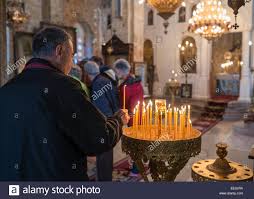 icons, she said to herself, “This isn’t like the Church I grew up in. This is more like family.” She got it! She said that, almost despite herself, she wound up lighting candles in the rest of the churches she visited. She got it! Orthodoxy spoke for itself. Nobody had to tell her. Orthodoxy may be crazy at times and disordered, but Orthodoxy is alive, Orthodoxy is love, Orthodoxy is family.
icons, she said to herself, “This isn’t like the Church I grew up in. This is more like family.” She got it! She said that, almost despite herself, she wound up lighting candles in the rest of the churches she visited. She got it! Orthodoxy spoke for itself. Nobody had to tell her. Orthodoxy may be crazy at times and disordered, but Orthodoxy is alive, Orthodoxy is love, Orthodoxy is family.
And that is my trip report from 2010.
Next Week – 3 saints whom I love for reasons I can’t explain: David the Dendrite, Martin the Merciful, the Venerable Bede
Week after Next: The Elevation of the Holy Cross

Love reading your travel stories, Father. As to your questions at the beginning:
1) Where does Christ command that the government force citizens to pay for the welfare of others?
2) I’m not sure one does better or worse. I’ve arguments and proofs for both, I guess it’s a matter of voter preference.
3) I think, at least in the US, the frame of mind regarding political conservatism and maintaining a traditional faith are fairly similar. Plus, the secularization of the Left has not made it a home for many conservative Christians.
Just my thoughts.
Thanks. Christ commands that if we love him, WE are to pay for the welfare of others. “Inasmuch as you’ve done it to the least of my brethren…” I don’t see it makes a difference how we arrange it – through government programs, Christian charities like IOCC, or by getting saints to work miracles – just so it gets done. Um… should the government stop “forcing” citizens to pay for the military defense of others? I have an old fashioned “Lincolnian” view of our form of government: The government is not “them”, the government is us, voted in by us, paid for by us to do what we believe is right – government “of the people, by the people and for the people”. Or at least it should be. Speaking only for myself, my faith leaves me very ill at ease with all current political groupings, whether right wing, left wing or middle-of-the-bird. To overstate the case, but not by much, one side doesn’t seem to care much about people before they’re born, and the other side doesn’t seem to care much about people after they’re born.
I’m with you, Fr. Bill. And didn’t Christ also say “render unto Caesar what is Caesar’s” meaning, keep your obligations to pay your taxes, support your government. In this case, WE are the government. At least we used to be. Until we let the oligarchs (corporations) take over.
You know, I had a funny experience with healthcare and conservatives… I always have heard political conservatives saying such things as “if people just help other people there will be no room for welfare” etc. However, when we adopted our daughter with massive delays and severe developmental issues, all these conservative friends said things like “don’t they have programs for kids like that?” Very few people offered to help with their own two hands, and nobody ever offered to help cover costs. So I am in favor of government healthcare because apparently conservatives don’t put their money where their mouth is. At least very few in my experience do. So they must be somewhat in favor of government programs if that’s what they suggest to be helpful to me…
I had a corollary experience some years ago. I visited a very nice family, well situated in an exurban home, who had a child with a severe handicap. First they talked about how the government was taking over our lives, and then they told me how worried they were about a proposed cutback in the government-funded social program which helped their child. I found it very confusing.
It is confusing! Personally I avoid government programs when I can because I have found them to be very difficult to work with, and my husband and I generally have the means to pay for what is absolutely necessary. But based on the clientele in the special needs pediatrics office, I would say that government assistance is giving a lot of severely disabled kids a chance at life that they otherwise wouldn’t have. Glory to God!
I’d say feel free to grandstand about your rights to keep your taxes and not have to pay for others and your right to this and your right to that. Just do it within Evangelical Protestantism. That’s the Christianity of American entitlement.
If you want to be Orthodox, the Church of Jesus Christ, the Church of sacrifice whose floor has run red with the blood of the Martyrs, you’re going to pick up your cross and leave all that behind.
The Orthodox Church has weathered much worse than “taxation without representation”
I should also mention, in all fairness, that I used to strongly identify with those anti-government-assistance conservative voices. I am by no means guiltless and have a lot of putting my money where my mouth is to do.
American politics confuse the life out of me. I gather that the government over there does provide for Education, law enforcement, and defense force? Why then, is healthcare such a contentious or even a political issue?
Anyway…I’ve just discovered your blog Fr and it seems like I’ll be adding it to my “must read” list.
In answer to your question: God only knows. For reasons I don’t understand there has always been a lot of “no-nothing-ism” in American politics – avoidance of reason and fact.